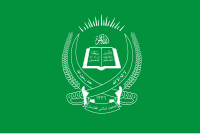
Back الجمعية الإسلامية الأفغانية Arabic الجمعيه الاسلاميه ARZ Cəmiyyət-i İslami Azerbaijani Jamiati Islami Catalan Dschamiat-i Islāmi German Τζαμιάτ-ε Ισλαμί Greek Jamiati Islami Spanish جمعیت اسلامی افغانستان Persian Jamiat-e Islami French Jamiat-e Islami ID
Jamayat-E-Islami (also rendered as Jamiat-e-Islami and Jamiati Islami; Persian: جمعیت اسلامی افغانستان, lit. 'Islamic Society'), sometimes shortened to Jamiat, is a predominantly Tajik political party and former paramilitary organisation in Afghanistan. It is the most oldest and largest political party in Afghanistan. It was originally formed as a student political society at Kabul University. It has a communitarian ideology based on Islamic law. During the Soviet–Afghan War and the following Afghan Civil War against the communist government, Jamiat-e Islami was one of the most powerful of the Afghan mujahideen groups. Burhanuddin Rabbani led the party (including its predecessors) from 1968 to 2011, and served as President of the Islamic State of Afghanistan from 1992 to 2001, in exile from 1996.[2]
- ^ "Jamiat-e Islami Party Leader Announces Formation of Supreme Decision-Making Council". Afghanistan International. 20 March 2024. Retrieved 20 March 2024.
- ^ Abasin Zaheer (20 January 2011). "JIA to see leadership changes: Faqiri". Pajhwork Afghan News. Retrieved 17 July 2011.mirror
© MMXXIII Rich X Search. We shall prevail. All rights reserved. Rich X Search

